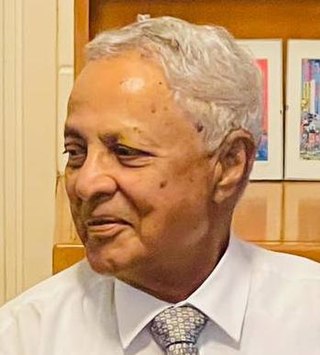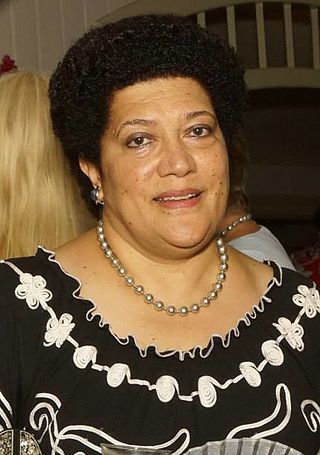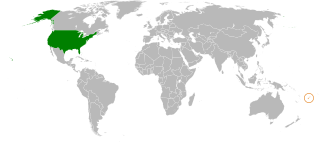Related Research Articles

Mahendra Pal Chaudhry is a Fijian politician and the leader of the Fiji Labour Party. Following a historic election in which he defeated the long-time former leader, Sitiveni Rabuka, the former trade union leader became Fiji's first Indo-Fijian Prime Minister on 19 May 1999, but exactly one year later, on 19 May 2000 he and most of his Cabinet were taken hostage by coup leader George Speight, in the Fiji coup of 2000. Unable to exercise his duties, he and his ministers were sacked by President Ratu Sir Kamisese Mara on 27 May; Mara intended to assume emergency powers himself but was himself deposed by the military leader, Commodore Frank Bainimarama.

The United Fiji Party was a political party in Fiji. It was founded in 2001 by Prime Minister Laisenia Qarase as a power base; it absorbed most of the Christian Democratic Alliance and other conservative groups, and its endorsement by the Great Council of Chiefs (Bose Levu Vakaturaga) caused it to be widely seen as the successor to the Alliance Party, the former ruling party that had dominated Fijian politics from the 1960s to the 1980s. It drew its support mainly from indigenous Fijiians.

Adi Koila Mara Nailatikau is a Fijian lawyer, who has served as a diplomat and politician. She was also First Lady of Fiji from 2009 until 2015, as the wife of Ratu Epeli Nailatikau, the President of Fiji.
Brigadier-General Ratu Epeli Ganilau, MC, MSD, is a Fijian former military officer and politician. His career previously encompassed such roles as Commander of the Fiji Military Forces and Chairman of the Bose Levu Vakaturaga. On 15 January 2007 he was sworn in as Minister for Fijian Affairs in the interim Cabinet formed in the wake of the military coup which deposed the Qarase government on 5 December 2006.

The Soqosoqo ni Vakavulewa ni Taukei (SVT), occasionally known in English as Fijian Political Party, was a party which dominated the politics of Fiji in the 1990s and was the mainstay of coalition governments from 1992 to 1999.

The United Peoples Party was a minor political party in Fiji. It represented mainly General Electors and multiracial people, and claimed to follow moderate, centrist policies. From 2001 it was led by Mick Beddoes, the sole member elected from the party to the 71-member House of Representatives in the general election.
Petero Mataca born at Cawaci, on Ovalau Island, served as the Roman Catholic archbishop of Suva, Fiji until his resignation in 2012.

In the midst of the strident public statements both for and against the legislation to establish a Reconciliation and Unity Commission with the power, subject to presidential approval, to compensate victims and pardon persons involved in the coup d'état which deposed the elected government in May 2000, a number of voices took more nuanced positions, or called for moderation and mutual understanding.

In the early 2000s, Prime Minister Laisenia Qarase's government proposed legislation to establish a Commission with the power, subject to presidential approval, to pardon perpetrators and compensate victims of the coup d'état against the elected government of Mahendra Chaudhry in 2000. Most Fijian politicians outside of the government came out against proposed legislation Along with many politicians, the Military and a number of business and professional organizations also came out against the bill. The campaign derived its name from the yellow ribbons promoted by the opposition United Peoples Party and worn by many citizens, as a sign of their opposition to the legislation.

The "Blue Ribbon campaign" was the name for the campaign promoting support for the controversial legislation introduced by the Fijian Government in 2005 to establish a Reconciliation and Unity Commission. The name specifically comes from the blue ribbons promoted by the ruling United Fiji Party as a sign of support for the bill. This campaign had the strong support of Prime Minister Laisenia Qarase, Attorney General Qoriniasi Bale, and other members of the ruling coalition and was warmly welcomed by imprisoned coup instigator George Speight. The proposed Commission was intended to have the power to grant compensation to victims, and amnesty to perpetrators, of the coup d'état which deposed the elected government in May 2000.
Mohammad Apisai Vuniyayawa Tora was a Fijian politician, soldier, and trade unionist. As a labour leader, he was a fighter for dock workers. As a soldier, he served in Malaya and later served as President of the Ex-Servicemen's League.

Commodore Frank Bainimarama, Commander of the Republic of Fiji Military Forces, had been a vociferous and uncompromising critic of the government's proposal to establish a Reconciliation and Unity Commission, with the power to grant compensation to victims of the 2000 Fijian coup d'état, and amnesty to perpetrators of it. Among other objections, the Military claimed that its integrity and discipline would be undermined if soldiers who mutinied in the 2000 upheaval were to be pardoned.

The Republic of Fiji Military Forces (RFMF) has always had a close relationship between the country's churches, particularly the Methodist Church, to which some two-thirds of indigenous Fijians belong. Relations became strained in 2005, however, over the church's support for the government's controversial Reconciliation and Unity Commission, which the Military strongly opposes. The Bill seeks to establish Commission empowered to compensate victims and pardon perpetrators of the coup d'état which deposed the elected government of Prime Minister, Mahendra Chaudhry in May 2000.

The controversial Reconciliation, Tolerance, and Unity Bill promoted by the Fijian government throughout 2005 generated enormous debate, both locally and internationally. The legislation aimed to establish a Commission empowered to compensate victims and pardon perpetrators of the coup d'état that deposed the elected government of Prime Minister Mahendra Chaudhry in May 2000. Support for the legislation came from Japan, while New Zealand opposed it. Australia, too, expressed strong reservations about the legislation, but also called on opponents of it, including the Military of Fiji, to show greater moderation. Non-governmental organizations in a number of countries took positions, also.

The Reconciliation and Unity Commission was a proposed government body to be set up if the Reconciliation, Tolerance, and Unity Bill, which was introduced into the Fijian Parliament on 4 May 2005 was passed. The legislation proposed to empower the Commission to grant amnesty to perpetrators of the Fiji coup of 2000, and compensation to victims of it from 19 May 2000 through 15 March 2001. The Fijian President would retain a veto over the granting of amnesty.

Religion plays an important role in Fijian society. Indigenous Fijians are overwhelmingly Christian, predominantly Methodist but with significant Roman Catholic, Assemblies of God, Seventh-day Adventist, and other Christian minorities; Indo-Fijians are mostly Hindu, with a large Muslim as well as a smaller Christian minority. Religious organizations and preachers have been vocal in their comments on the controversial legislation that seeks to establish a commission with the power to compensate victims and pardon perpetrators of the coup d'état which shook Fiji to its foundations in 2000.
The People's Charter for Change, Peace and Progress was a proposed legal document which would have complemented the 1997 Constitution of Fiji. It would have established compulsory guidelines for any government policy in Fiji over the coming years. The People's Charter was due to be completed and come into force prior to the scheduled 2014 general election.

Fiji–United States relations are the bilateral relations between the Fiji and the United States. The relationship has improved significantly since Fiji's elections in September 2014, which restored a democratically elected government to Fiji for the first time since 2006. The United States had opposed Fiji's unelected government, which came to power through a military coup in December 2006.

Ratu Josefa Iloilovatu Uluivuda, was a Fijian politician who served as the 3rd President of Fiji from 2000 until 2009, excluding a brief period from 5 December 2006 to 4 January 2007. He held the traditional title of Tui Vuda, the paramount chief of the Vuda district in Ba Province on Fiji's northwest coast. Like many Fijian people, he rarely used his surname and was known simply as Josefa Iloilo. He announced on 28 July 2009 that he would be leaving office on 30 July. At the age of 88, he was the world's oldest head of state.

Fiji's fourth constitution was signed into law by President Ratu Epeli Nailatikau on 6 September 2013, coming into effect immediately. It is the first to eliminate race-based electoral rolls, race-based seat quotas, district-based representation, the unelected upper chamber, and the role of the hereditary Council of Chiefs. It vests sole legislative authority in a single-chamber, 50-seat, at-large Parliament, to be first convened following general elections in 2014. It is also the first ever to grant the right to multiple citizenship, and lowers the voting age to 18.
References
- ↑ "Fiji Chamber of Commerce says coup clock cannot be turned back". RNZ. 12 December 2006. Retrieved 17 March 2023.